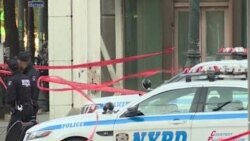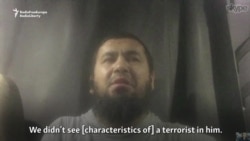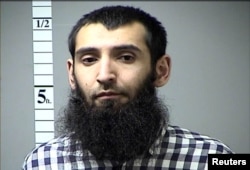Uzbeks condemned Tuesday's terror attack in New York City, saying it does not represent who they are. But there also was a warning that more attacks could follow from fundamentalists who have been radicalized by repression at home or have been unable to assimilate after moving to the United States.
"We deplore what happened in New York," said Norkhoja Sodiqov of the Vatandosh Uzbek-American Federation in New York. "This act of terror does not represent who we are as Uzbeks. We are peace-loving, hardworking and compassionate people, who are here because we want a better life."
Sayfullo Saipov, 29, who moved from Uzbekistan to the United States in 2010, was identified as the man who drove a truck down a pedestrian and bicycle path in Manhattan, killing at least eight people and injuring others.
"He did this in the name of ISIS, and along with the other items recovered at the scene was some notes that further indicate that," said John Miller, deputy commissioner of Intelligence and Counterterrorism of the NYPD, using an acronym for Islamic State. "He appears to have followed almost exactly to a 'T' the instructions that ISIS has put out in its social media channels before with instructions to their followers on how to carry out such an attack."
WATCH: Acquaintance Speaks Out about Suspect
Gulnoza Said, a journalist and researcher for the Committee to Protect Journalists, is one of many Uzbeks who call New York City their new home. She says the community is shocked and saddened by the attack.
"We are all still processing the news and trying to understand," she told VOA.
Said is among the Uzbeks who live in what she calls a peaceful community of people from many backgrounds in Brooklyn; there are other pockets of Uzbeks in Queens, Manhattan and New Jersey, where Saipov resided.
Said had just returned home from trick-or-treating with her son, both dressed as vampires, when she turned on the TV and heard about the attack.
"It's a terrible tragedy," Said said. "We are shocked, first by the news there was such an attack in NYC and, second, that it was carried out by an Uzbek man.
"We all condemn this attack. It is something that should never happen, not in New York," she said, adding that New Yorkers won't be cowed. "New Yorkers are tough. They are not scared easily. Life will go on."
'Unprepared for a new life'
Sukhrobjon Ismoilov, a lawyer and financial adviser who moved to New York from Uzbekistan five years ago, said he has worked with Central Asians who were persecuted for their religious practices. He said he has been asked repeatedly about what could have driven people from that part of the world to choose a path like Saipov's.
"I think one of the major reasons could be radicalization and marginalization due to several factors," Ismoilov said, citing repression that dates back to before the breakup of the Soviet Union. "Some of them are fully unprepared for a new life here."
He cited language barriers that lead some people to stick with other immigrants from the same country, so they don't embrace local society and traditions. That leads to domestic violence and divorces, he said, while some send their children back to their native country rather than having them raised in the United States.
Ismoilov worries that the attack could be used by President Donald Trump's administration to crack down on immigration. Uzbekistan is not on Trump's list of countries for which immigration has been halted, but that could change. He urged fellow Uzbeks to watch out for individuals who might show signs of radicalization.
"I think the governments of the U.S. and Central Asia, particularly Uzbekistan, should be ready for seeing several more such events coming in the nearest future," Ismoilov said. "There are still some more fundamentalists who were either were marginalized or radicalized."
He urged Uzbeks to "keep their eyes open and their ears open" and report such people to U.S. authorities, pointing out that about 1,500 Uzbeks who went to fight in Syria are going home or going to fight in other countries.
VOA Uzbek contributed to this report







